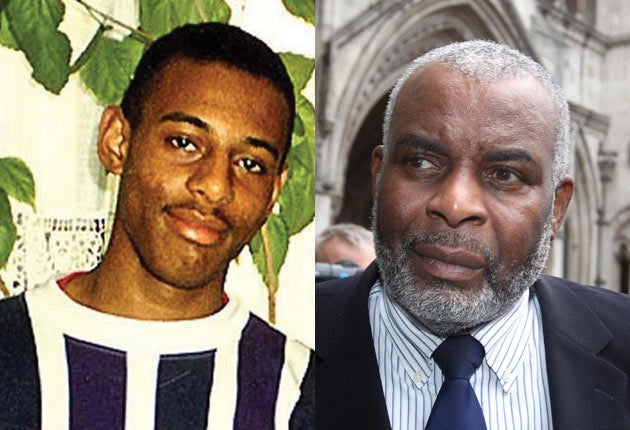Eighteen years on, two of original suspects in Stephen Lawrence murder to stand trial

The brutal murder of Stephen Lawrence on 22 April 1993 and the failure to convict those responsible opened the country's largest police force to accusations of "institutional racism" and transformed race relations law.
Yesterday, after an 18-year search for justice, Stephen's parents listened as a judge ordered that two of the original five suspects – Gary Dobson, 35, and David Norris, 34 – must stand trial for the murder.
The Lord Chief Justice, Lord Judge, said: "The murder of Stephen Lawrence, a young black man of great promise, targeted and killed by a group of white youths just because of the colour of his skin, was indeed a calamitous crime." He said new evidence was sufficient for him to order a fresh trial this November, but cautioned that "the presumption of innocence continues to apply".
An 18-year-old Stephen and his friend Duwayne Brooks were waiting at a bus stop in Eltham, greater London, when a gang of white youths attacked them. While his friend managed to escape, Stephen Lawrence was stabbed twice. Mortally wounded, he staggered to his feet and ran, but collapsed a short while later on the pavement.
Frustrated by the failure of the original police investigation, the Lawrence family took a private prosecution in 1996 against Dobson, Luke Knight and Neil Acourt. However, after identification evidence was declared inadmissible, the case collapsed and all three defendants were found not guilty.
In 1999, an inquiry headed by Sir William Macpherson examined the original Metropolitan Police investigation and concluded that the force was "institutionally racist". He made 70 recommendations that would have an impact on race relations inside and outside the police and court system.
Macpherson's report also recommended a change in the law relating to double jeopardy – which had prevented retrying suspects for the same crime. In 2003, it was amended to allow a fresh trial if "new and compelling evidence" was produced.
Quashing Dobson's acquittal yesterday, Lord Judge said that he was satisfied that was the case, having seen new forensic evidence relating to a grey bomber jacket and multi-coloured cardigan linked to Dobson.
"It does not and could not demonstrate that Dobson wielded the knife which caused the fatal wound, but given the circumstances of the attack on Stephen Lawrence, that is a group of youths in a violent enterprise converging on a young man and attacking him as a group, it would be open to a jury to conclude that any one of those who participated in the attack was party to the killing and guilty of murder, or alternatively manslaughter.
"If reliable, the new scientific evidence would place Dobson in very close proximity indeed to Stephen Lawrence," said Lord Judge, sitting with Mrs Justice Rafferty and Mr Justice Holroyde at the Court of Appeal.
However, he also pointed out that Timothy Roberts QC, on behalf of Dobson, had argued that the evidence was unreliable because it was likely to have been caused by cross-contamination between his client's clothing and the victim's, adding "on this basis, even if the scientific evidence is reliable, the apparent links are unconnected with Dobson's presence and involvement at the scene, but rather the result of outdated and incompetent storage or packaging or transporting arrangements". The barrister had also argued that adverse publicity made a fair trial impossible.
Nevertheless, Lord Judge said yesterday: "After conducting a detailed examination of a large body of evidence, we have come to the conclusion that there is sufficient reliable and substantial new evidence to justify the quashing of the acquittal and to order a new trial."
Yesterday the police and Crown Prosecution Service said they had worked "tirelessly" since a full forensic review began in 2006, adding: "Our thoughts at this stage go to (the) family, who have never given up their quest to see justice for Stephen."
Stephen's mother, Doreen Lawrence, said: "I am really pleased by the judgment, which has been a long time coming, but we still have a long way to go. All I can think about is Stephen and that perhaps somewhere down the line we will finally get justice for him."
The double jeopardy law
Until 2003, there was a long-standing double jeopardy rule that a defendant could not be tried twice for the same crime. In court, the accused would enter a plea of "autrefois convict" or "autrefois acquit", indicating that they had already been convicted or cleared of the offence.
The Criminal Justice Act 2003 changed the law to allow a retrial if there is "new and compelling" evidence for serious crimes, including murder, rape, armed robbery, and some drug offences. The Act came into force in April 2005, but can be applied retrospectively, as it has here. Retrials must be approved by the Director of Public Prosecutions in the public interest, and the Court of Appeal must agree to quash the original acquittal.
Subscribe to Independent Premium to bookmark this article
Want to bookmark your favourite articles and stories to read or reference later? Start your Independent Premium subscription today.
